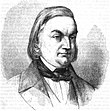Émile Souvestre
Émile Souvestre (born April 15, 1806 in Morlaix (Finistère), † July 5, 1854 in Paris ) was a French novelist and stage poet.
Life
Émile Souvestre began studying law in Rennes, but soon discovered his interest in literature. In 1826 he came to Paris for the first time, where his first play Le Siège de Missolonghi was to be performed. Since the censorship demanded cuts, which Souvestre did not accept, it was ultimately not performed. In 1828 his brother died, so that he had to return to Brittany to support his family. There he earned his living writing articles for various newspapers and as a rhetoric teacher in Brest and later in Mulhouse. In 1830 he married Cécile-Marie Ballot Beaupré, who, however, died in 1831. In 1832 he went into his second marriage to Angéline-Anne Papot, with whom he had three daughters, including Marie Souvestre , who later became a feminist and head of boarding schools for girls . In 1836 he settled permanently in Paris with his family, first made himself known through portrayals of Brittany - Le Finistère en 1836 , La Bretagne pittoresque (1841) - and then produced a large number of novels, including dramas and vaudevilles , which had a rich talent express for observation. In addition, Souvestre devoted himself to the collection and publication of fairy tales.
In his novels, the philosophizing or moralizing (that is, the socialist sharpness emphasizing the contrast between poor and rich) comes to the fore. The following should be emphasized: Riche et pauvre (1836); Les derniers Bretons (1837); Pierre and Jean (1842); Les Réprouvés et les Élus (1845); Le Monde tel qu'il sera (1846, the first French anti-utopia ), Confessions d'un ouvrier (1851); those awarded by the Academy: Un philosophe sous les toits ; Au coin du feu and Sous latonnelle (1851); Le memorial de famille (1854).
His dramatic poems, such as Henri Hamelin , L'oncle Baptiste , La Parisienne , Le Mousse, etc., form the contrast to Scribe's pieces in that they do not depict the wealthy, like these, but predominantly the dispossessed classes as the main representatives of morality. His ingenious Causeries historiques et littéraires (1854, two volumes) should also be mentioned.
A complete edition of Souvestre's works, some of which have been translated into German, appeared in the “Collection Lévy” (60 volumes).
Adaptations
The play Le pasteur, ou L'évangile et le foyer by Émile Souvestre and Eugène Bourgeois , premiered in 1849, served as the basis for Giuseppe Verdi's opera Stiffelio, which premiered in Trieste in 1850 .
fairy tale
- Peronnik the Simple - Péronnik l'Idiot ; the motifs are partly reminiscent of Parzival . The fairy tale is from Basse-Bretagne .
- The Corac'h from the island of Lok - The fairy tale has a motif similar to that of the Swedish fairy tale First born, first married . The fairy tale comes from Basse-Bretagne .
- Comorre - the story is partly reminiscent of Bluebeard . Comorre is a legend from Basse-Bretagne .
- Keris , the legend of the city submerged in the sea, is also reminiscent of the legend of Vineta . Keris is also called Is or Ys . The fairy tale comes from Basse-Bretagne .
literature
- Max Ulrich Balsiger: Divine service in the opera - Verdi's “Stiffelio” as a reflex of Pietism . In: NZZ , September 25, 2004
Web links
- Literature by and about Émile Souvestre in the catalog of the German National Library
- Émile Souvestre in the Internet Speculative Fiction Database (English)
- Works by and about Émile Souvestre at Open Library
Individual evidence
- ^ Matthias Hausmann: The training of anti-utopia in France in the 19th century . Heidelberg 2009, p. 211
- ^ This fairy tale in: Friedrich von der Leyen, Paul Zaunert (ed.): French fairy tales Volume II - from recent collections; translated by Ernst Tegethoff. Eugen Diederichs-Verlag, Jena 1923
- ↑ These above fairy tales in Bretonische Märchen ed. and translated by Ré Soupault . Eugen Diederichs-Verlag, Düsseldorf / Cologne 1959
| personal data | |
|---|---|
| SURNAME | Souvestre, Émile |
| BRIEF DESCRIPTION | French novelist and stage poet |
| DATE OF BIRTH | April 15, 1806 |
| PLACE OF BIRTH | Morlaix (Finistère) |
| DATE OF DEATH | July 5, 1854 |
| Place of death | Paris |


